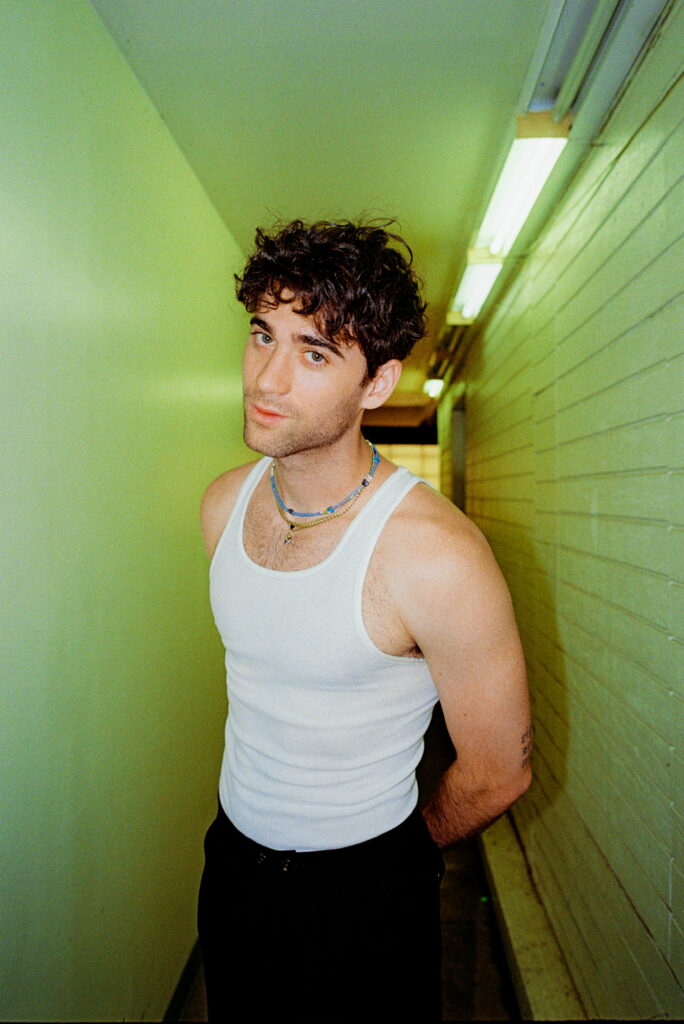While Alexander 23 has serenaded hundreds of cities across the US, the Windy City will always have a special place in his heart. As someone who’s spent much of his childhood in and out of Chicago, the singer was eager to return to his roots for Lollapalooza. There, he was greeted by family, hometown friends and festival goers. And if the crowd’s reaction is a testament to anything, it was certainly a welcome homecoming, indeed. In a whirlwind 24 hours, Alexander played two festival shows and one aftershow (fueled by pure adrenaline and Malört, the singer shares).
“There was a funny moment before the third show,” the 27-year-old shares. “We were in the green room, feeling excited about the show, but we’d been up for 20 hours at that point and played two shows in the sun. My guitar player just disappeared, and we didn’t see him for 20 minutes. He comes back smiling ear to ear with a huge bottle of the Malört. I don’t know if you’re familiar with it, but it’s a Chicago homegrown type of alcohol. And I happen to like the taste, but I think most people would strongly disagree with that assessment of the taste. But it certainly woke us up and we joke that that move saved the weekend.”
And in addition to taking a slew of behind-the-scene film photos for VMAN, the singer also documented his experience in this short film he released on Instagram. Each performance at Lollapalooza was unique, with the artist sharing that he had tailored the set list based on the crowd’s vibe. The diverging setlists included fan favorites like “IDK You Yet” and “Cry Over Boys” as well as songs from his newly released album, Aftershock. Out last month, via Interscope Records, the album documents the artist’s journey through heartbreak. And in an interview with the artist, he confesses it might be his most intimate work to date.
“For me, this feels like the music I’ve always wanted to make and never had the guts to make,” he elaborates. “Grieving relationships are a really strange thing because these people still exist in the world. They just don’t exist in your world anymore.”
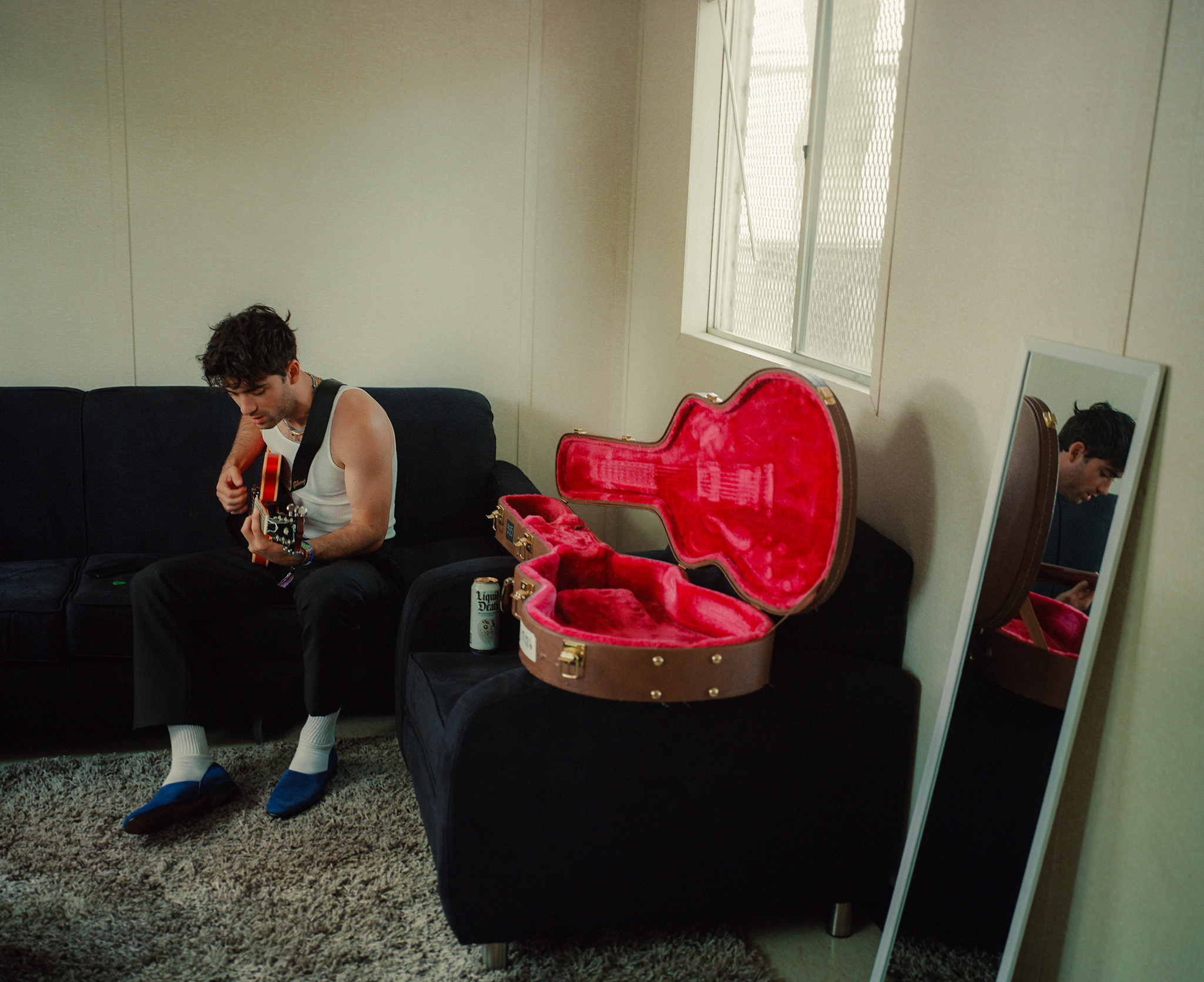
The resulting 11 tracks encapsulate one’s experience of love and loss, each track representing a different chapter of his emotional journey. Between candid lyrics and infectious guitar riffs, the singer bears all to provide an incredibly intimate look into the musician’s life. And much like the rest of his discography, the songs on Aftershock have definitely struck a chord with this generation. This fall, you can see Alexander perform live as he’s taking his new collection of songs on a tour across the US and Europe.
“This sounds so cliche, but I think cliche for a reason,” he laughs. “I just want my listeners to feel understood. I think of my music, and especially this album, like a toolbox. It’s something you can reach for when you’re feeling different stuff.”
For more insight into Alexander’s latest album, read below.
VMAN: How was your Lollapalooza performance? From what I’ve seen on social media, it looked very fun.
ALEXANDER 23: It was amazing. I’m from Chicago, so Lolla was already such an amazing festival but to have my family and friends there was pretty amazing.
VMAN: And you had two shows and then an after-show?
A: Yeah, so we had three shows in one day. It was two shows at the festival and then an after-show. It was a lot. I remember sitting in the green room before the third show being like, “I don’t know how we’re gonna do this.” But, you take a couple of shots of Malört, and you get out there. You feel the energy, and all of a sudden it’s easy again.
VMAN: What was your process of preparing for the day?
A: My process was definitely inhibited by my excitement of seeing my own friends and being in Chicago. It’s easy to say, “Okay, Friday night. I got three shows tomorrow. I’m not going out.” But then obviously, you’re going out. It’s Friday night, and Lollapalooza is in Chicago, so all processes were kind of out the window, and we just were trying to keep our heads above water. But it’s the kind of thing where you’re as tired as you could ever be when you get on stage, and people are singing your songs it doesn’t even matter. You’re just back.
VMAN: Was there one set list for each of the shows or did you change it up with each one?
A: Yeah, there was a ton of people that were there at all three, which to me, was the coolest thing ever. Every show I asked who was at the last show and during the third show, I was like, “Alright, who was at all three shows today?” It was a shocking amount of people which is really cool. We did a different setlist for every show. I think it’s one of the cool parts about putting out music is that you have more to play with and more to mold into different sets. It was really nice to have so many things to choose from.
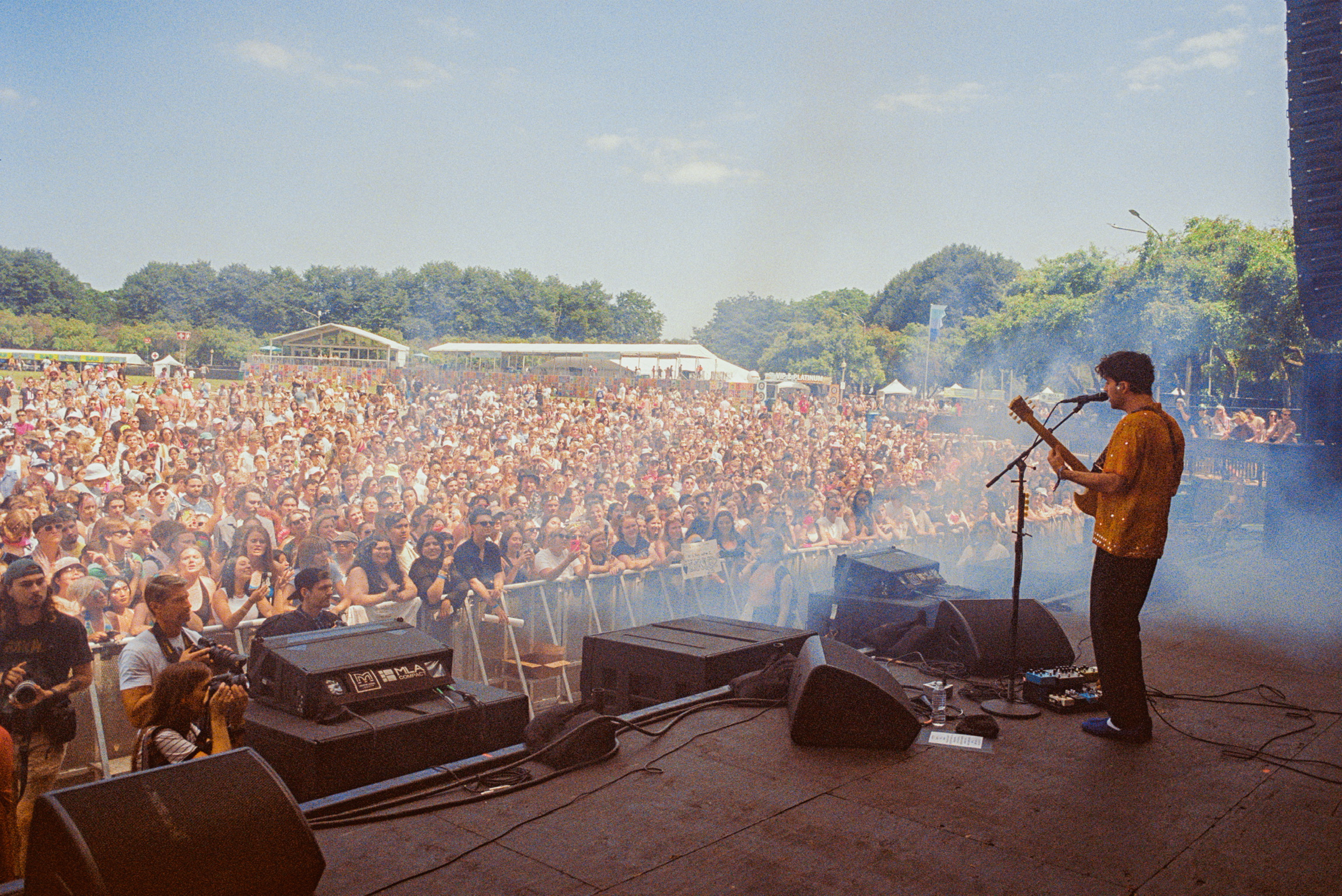
VMAN: For sure. And was there a favorite moment that you’ll remember forever?
A: There was a funny moment before the third show, we were in the green room feeling excited about the show, but we’d been up for 20 hours at that point and played two shows in the sun. We didn’t sleep that much the night before and certainly didn’t sleep that much on Thursday night either. My guitar player just disappeared, and we didn’t see him for 20 minutes. He comes back smiling ear to ear with a huge bottle of the Malört. I don’t know if you’re familiar with it, but it’s a Chicago homegrown type of alcohol. And I happen to like the taste, but I think most people would strongly disagree with that assessment of the taste. But it certainly woke us up and we joke that that move saved the weekend.
VMAN: Oh no way! And for someone who’s never been to Lolla or Chicago, how would you describe the energy of this festival?
A: I’ll describe it through a story. My friend, my roommate from LA who was my friend from college, flew in for the festival and in two days, he was certain he was going to move to Chicago. I was like “Dude, you got to slow down bro. You’ve not been here in January, you don’t understand what it’s actually like living here.” But it’s the best of Chicago in every way. I think [the festival] just sells the city. On one side you got a beautiful lake view and on the other side you got the famous skyline. It just sells the city in such a crazy way.
VMAN: Did you show them any specific Chicago sites or was it mostly the festival?
A: We definitely did some Chicago sites. Went to my favorite sandwich place J.P. Graziano. Shout out to J.P. Graziano, just unbelievable sandwiches. Unfortunately, we didn’t hit any deep dish places which is honestly embarrassing now that I’m saying that out loud. I also had five sets over the course of four days. But it felt like a weekend home with my home friends and my family in a really nice way.
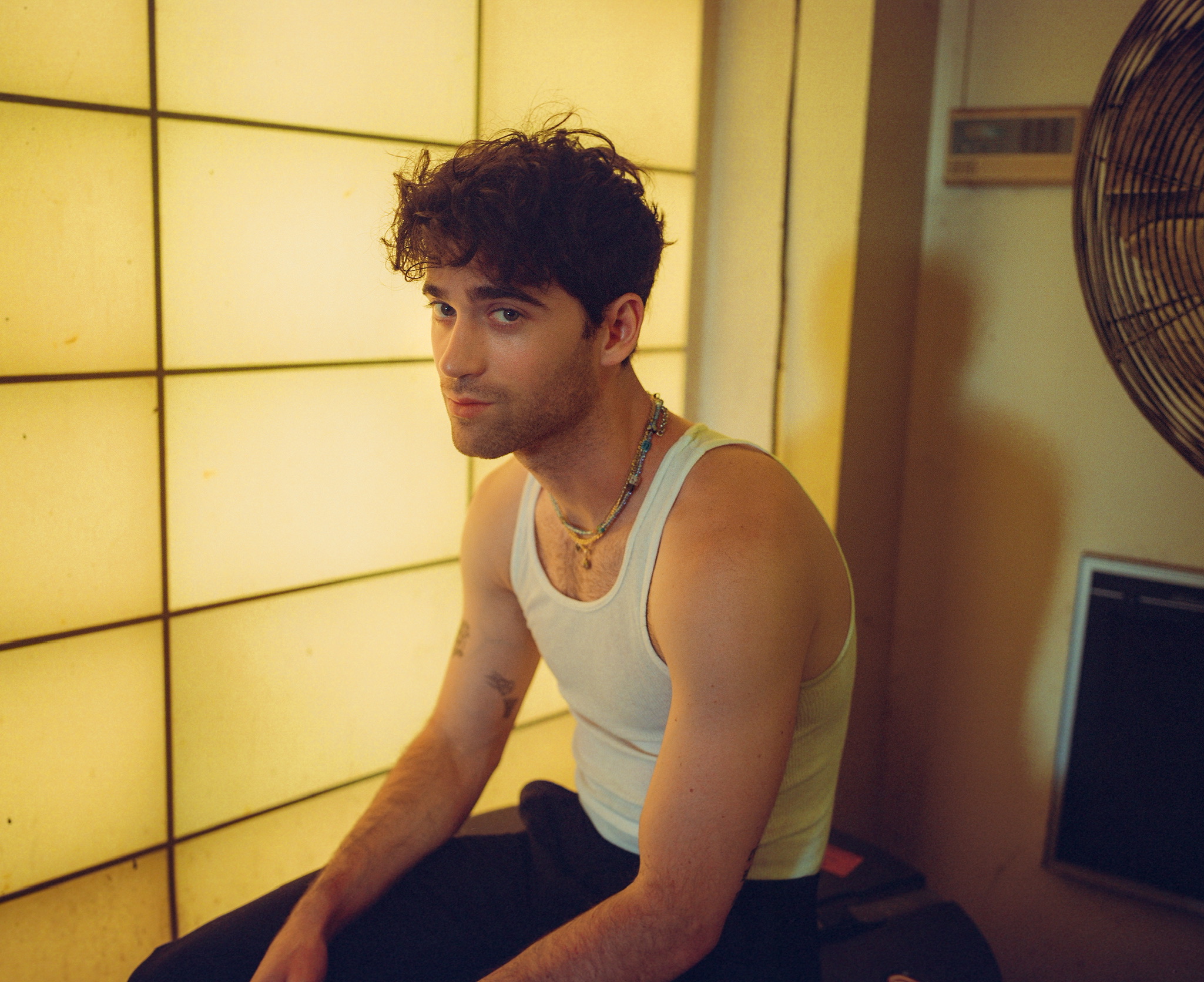
VMAN: That’s amazing. And what was it like playing some of your songs from your debut album for the first time at Lolla?
A: The first song in the set we were doing was “Cosplay,” which to me is one of my favorite songs to play live. It feels like the perfect amount of energy to kick the set off with so that was definitely super fun. And then for the third show, I got to play some of the less popular songs from the album and I got to play a song called “RIP You and Me,” which is one of my favorite songs off the album. It was really special. I was a little nervous going into the show, but when I started playing and hearing people sing it totally energized the band and me. It actually ended up being one of my favorite songs to play.
VMAN: And speaking of your debut album, Aftershock, which was released not too long ago. Where did you start off with that project?
A: It was a really conscious choice to try and write an album. I was feeling exhausted by the rat race of putting out single after single, getting internet momentum and then asking, “How do we leverage this momentum?” I was feeling really burnt out and I felt artistically ready to try and do an album. So for me, creating the album was such an amazing space to have more autonomy over my taste. I got to experiment with different sounds without the pressure of, “This needs to be the next song.” So just from my creative fulfillment perspective, it was just something I really enjoyed.
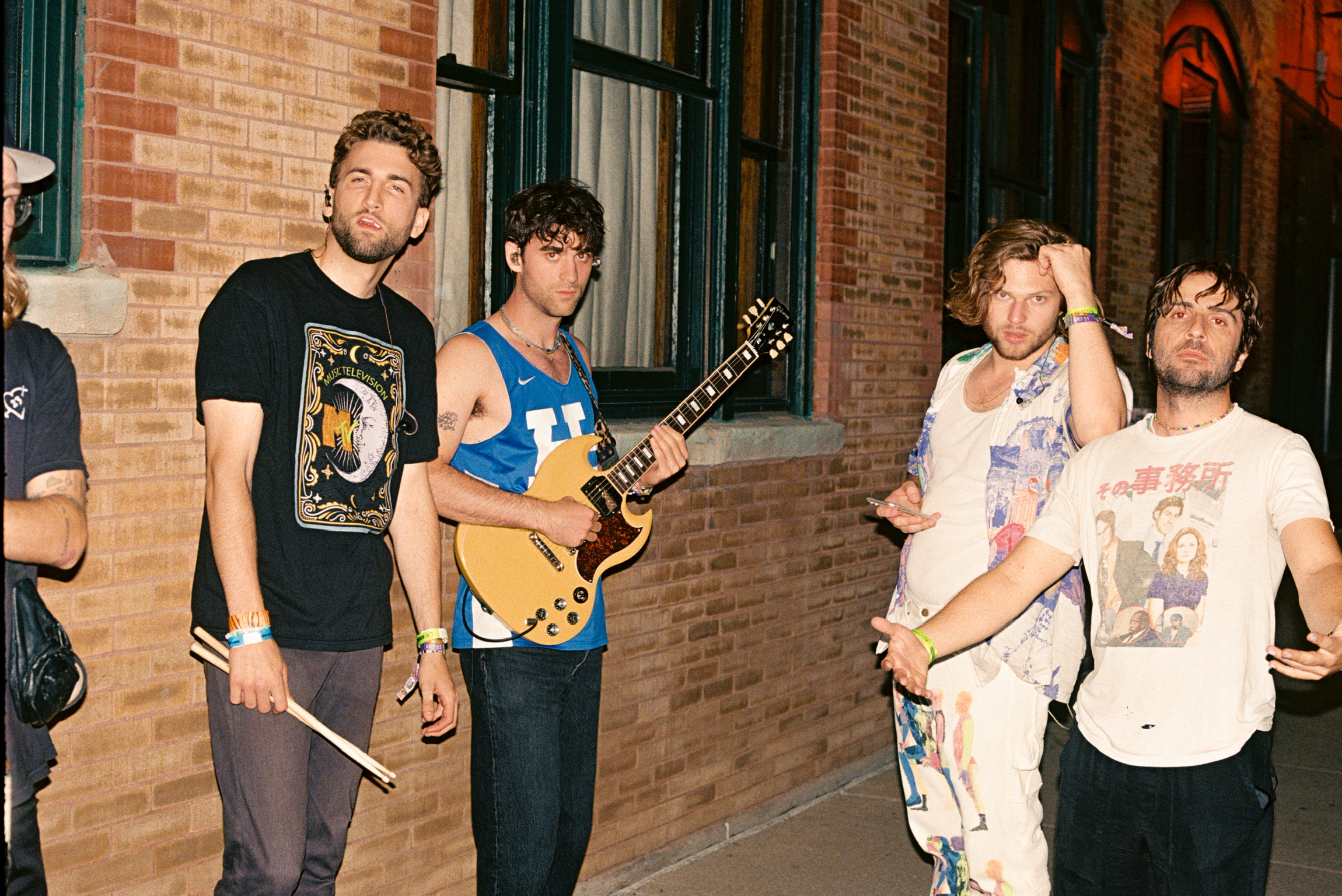
VMAN: Very cool, so this time around, what was it like in the studio with you and your collaborators? Would you go into a studio recording with ideas already?
A: I think it depended on the collaborator most of the time. I produced half of the album with my friend Dan Nigro, who is my favorite producer in the world. I feel very fortunate to have gotten to do that. Most of the time when I was with Dan I would come in with some ideas or a song start or sometimes even a whole song done. And then we would just completely reproduce it and overhaul it. But then some of the more songwriter people I worked with, like Amy Allen or, I wrote a song with Olivia Rodrigo for the album, those were like, “Hey, come to my house. Let’s just sit down with two guitars and see what we can do. Let’s see how far we can get.” And that was really special to me. I think some people work really well with new people all the time and have a bunch of people work on their stuff. But for me, I’ve never felt comfortable with that. I just can’t open up that fast. So I knew that I wanted to bring some other people in, but I knew that it had to be my friends. I think I just got extremely lucky that my friends also happened to be really really fucking good at music [laughs].
VMAN: You can definitely tell. The album comes off as an intimate look into a part of your life, and I feel like it wouldn’t technically translate if you weren’t comfortable with the people who are helping you form the album.
A: Most of [the album] is about this one person and strangely enough Dan is actually one of the collaborators that didn’t know her personally like the rest of them. It was important for them to understand it on more than just an emotional level, actually a physical existence level. Having existed in the same space I think can be really powerful, just intuitively understanding how someone feels. I think a lot of the album is about grief. When I set out to write this, it wasn’t that I wanted to write an album about grief. I think it was more of me understanding how many forms grief can take on, and I think like that song, “Live in me Forever,” is super applicable looking back because I’ve always looked at grief in my life as this binary thing that’s associated only with death, and you can only grieve something that’s dead. But I think it’s such a spectrum of things that you can grieve. Grieving relationships are a really strange thing because these people still exist in the world. They just don’t exist in your world anymore. And reconciling those two things, for me at least, was really, really, really difficult. And that was the goal of the album. Looking back it’s so funny because I can say all these things now, but when I was in the moment it was just like, “This sucks. This sucks. This sucks. I’m gonna write about it, this sucks”. But now looking back I almost feel like I have a bird’s eye view of my own creative process.
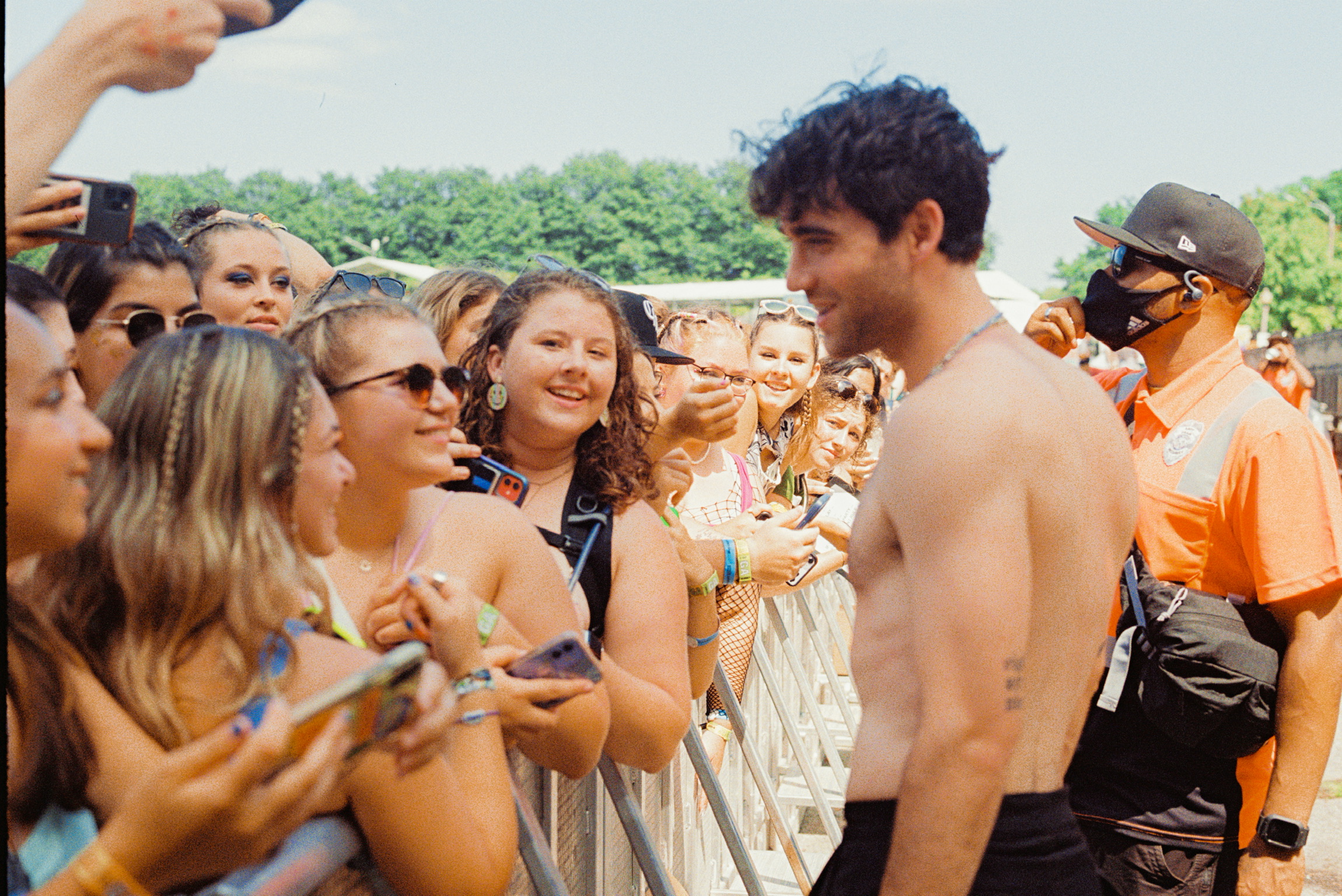
VMAN: Yeah you can feel that for sure. How did you try to convey those feelings of anguish and sadness and grief sonically?
A: I think it definitely felt more authentic to the themes in the music to use more real instruments than I ever had before. It made me feel really human. All the emotions I was discussing felt so incredibly human in every sense and I wanted that to be matched. For me, this feels like the music I’ve always wanted to make and never had the guts to make. I don’t know if hidden is the right word, but nothing is hidden behind production tricks or stuff like that. And it was important for me this time around to just really, really stand by the emotion of the song and do all the production and service to that. So there’s a lot of guitar, there’s a lot of piano. It feels like a person playing and singing this, or at least I hope it does. And that was definitely the goal.
VMAN: Yeah, it’s very raw. With that, what do you hope the album does for people?
A: I think the best way I’ve learned to answer this question is: I don’t think there’s a message. I don’t want people to listen to this album and be like “Alright, it’s gonna be okay.” This sounds so cliche, but I think cliche for a reason. I just want my listeners to feel understood. I think of my music, and especially this album, like a toolbox. It’s something you can reach for when you’re feeling different stuff. So if you’re really missing someone who passed away in a finite way, there’s a song. If you’re out meeting new people and it feels really fucking weird, you can listen to “Cosplay.” Or if we were at a party and you’re missing the person you spent three and a half years of your life with and thought you’re gonna be with forever, there’s a whole lot of songs for that, too. I just think of it as this toolbox that I’ve gone through this stuff. I’m obviously not the only one. I am just afforded the space and time to really explore these feelings and translate them into music. And so for other people who don’t have that luxury, you can just listen to my album.
VMAN: I feel like that’s a really good way to put it. Where does the tile, Aftershock, come from? How did you come up with it?
A: I pretty much banged my head against the wall for months trying to come up with an album title. It was the bane of my existence. I could not do it. I had so many ideas, and none of them felt remotely close to right, not even almost there. I was in the middle of the tour and decided to take a ski trip to Breckenridge, which looking back is kind of a crazy move. But we had three days off, and me and a couple of the guys were like fuck it, let’s go to Breckenridge and ski. And so I was there, and I was in my friend’s bathroom. He had some Old Spice After Hours. And I was like, “After. I like the word After.” I was trying to come up different iterations and ways to put a twist on it and finally decided on Aftershock. First I was like, “Aftershock is a cool word, but what can it like mean to me?” And then I was like, “This is like an aftershock.” If you think of the breakup as an earthquake, this is the immediate emotional response to that main event. So it all just came into place.
VMAN: It’s very poetic. You weren’t forcing anything, it just came naturally.
A: That’s always how it is. If you squeeze something too hard, you’re gonna lose it. I was trying so hard, and then after a full day of skiing and a couple of drinks, it all clicked. It’s honestly a good lesson. I will certainly not heed the advice of that lesson. I will continue to overthink things, but at least I learned it at some point.
VMAN: What are you most looking forward to about the tour you’re about to embark on?
A: I’m about to go to Asia for the first time, which I’m really excited about. And I’m going to Australia and New Zealand. And then I have my headline US and Europe tour this fall. I’m obviously excited to go on tour. As you put out music this hidden benefit of it is that the show gets better because you have more songs to choose from and so for me having all these songs in the arsenal and getting to tailor each set to like the way I’m showing, this is a really exciting thing.
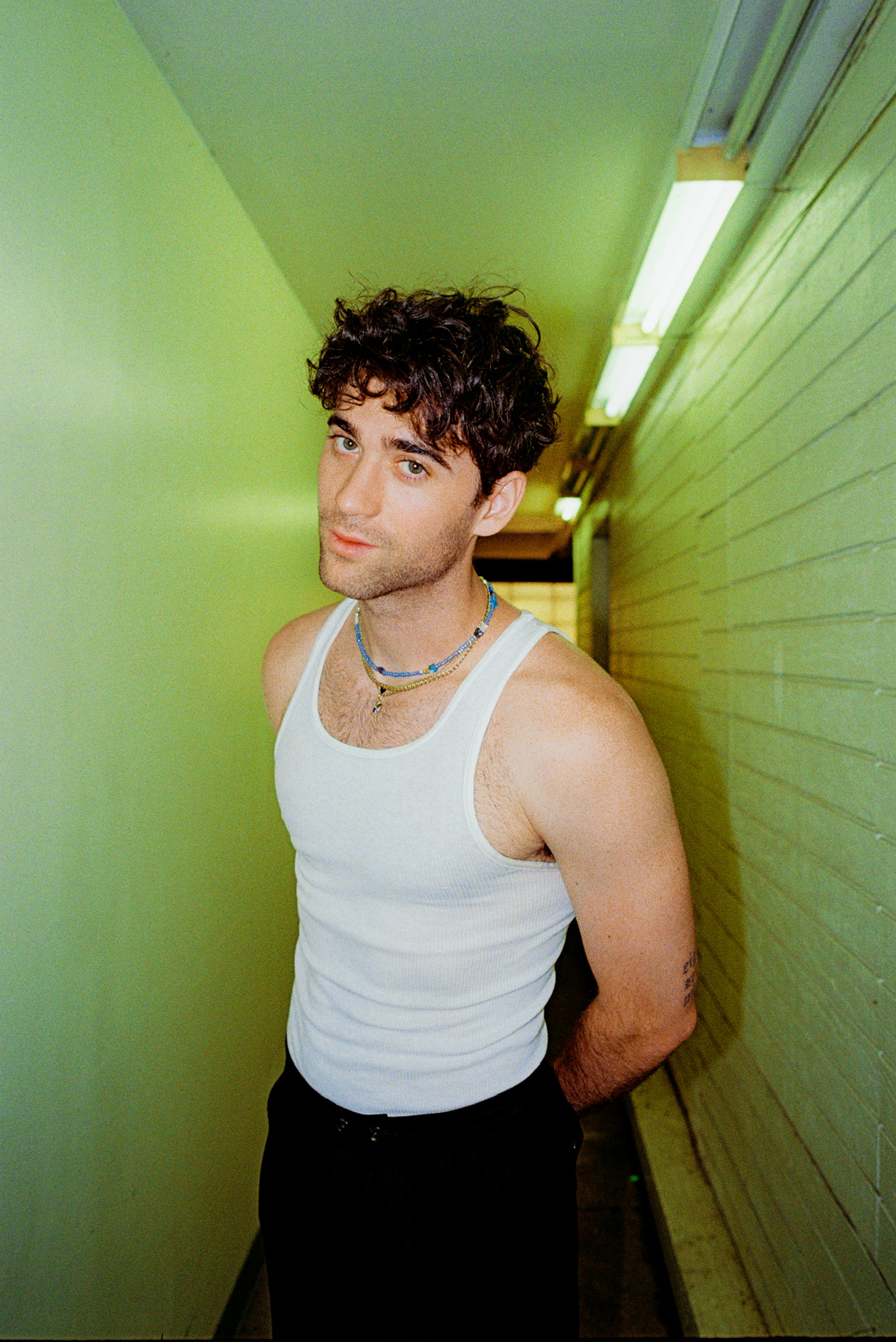
Discover More
